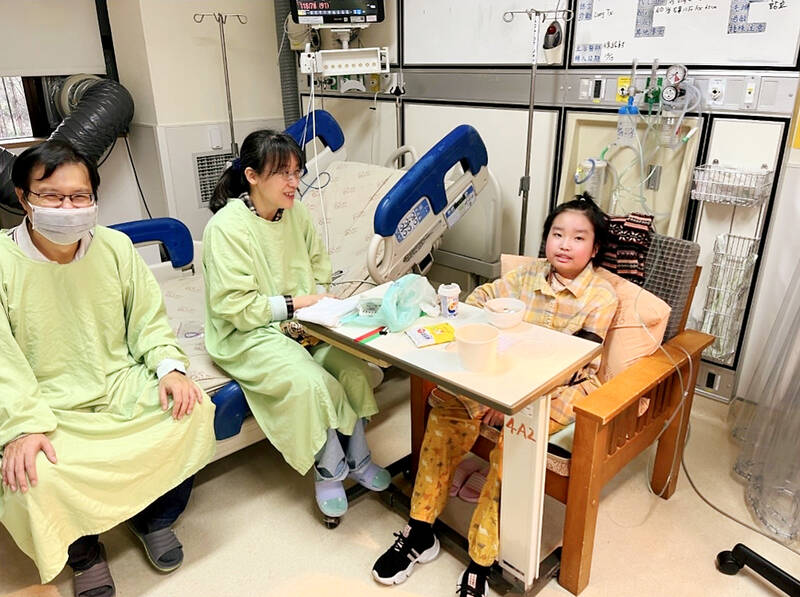Doctors achieved a Taiwan first with a lung transplant on an 11-year-old girl, National Taiwan University Hospital (NTUH) told a news conference in Taipei yesterday.
Surgeons in October completed a 15-hour operation to replace the child’s damaged lungs with donations from her father’s lower right lung and the lower left lung of her mother, said Hsu Hsao-hsun (徐紹勛), head of the hospital’s thoracic surgery unit.
The girl, surnamed Liao (廖), was transferred to NTUH from another hospital in July last year after a cellulitis infection developed into sepsis, which required her to be put on life support, Hsu said.

Photo copied by Yang Yuan-ting, Taipei Times
Liao was put on a transplant waiting list, but no suitable lungs were found due to a chronic shortage of registered organ donors, he said, adding that living donations from family members comprise the vast majority of the nation’s liver and kidney transplants.
The parents consented to each donate lung portions when doctors presented them with the option, he said.
In 2005, NTUH was certified to perform live lung transplants by what was at the time the department of health, he said.
The hospital has carefully maintained the capability to carry out the procedure, Hsu said.
Regulations stipulate that living donations of lungs must come from two blood relatives within five degrees of separation from the recipient, while there are additional medical requirements linked to lung health, age and body size, he said.
NTUH did not make the decision to proceed with the transplant lightly, as the chances of success for the operation were assessed at no more than 50 percent by Kyoto University Hospital, the world’s leading authority on the procedure, Hsu said.
The operation presented a significant challenge, as the lung tissue had to be removed from two donors and transplanted into the patient, with each step carrying a risk of death, he said.
Four surgical teams rehearsed the operation in 16 planning sessions before conducting the procedure, he said.
Children who get lung transplants have a 10-year survival rate of 80 percent and Liao’s prognosis is likely better because transplants from blood relatives carry a smaller risk of rejection, he said.
The girl is in physical therapy to ensure the transplants remain healthy and grow with her, he added.
Liao’s father said it was trying to see their child on the verge of death.
He jumped at the chance to save his daughter’s life, he said.
The sole concern he had with the procedure was his high blood-sugar levels, which could have made his lung tissue unsuitable for transplantation, the father added.
Additional reporting by CNA

The High Prosecutors’ Office yesterday withdrew an appeal against the acquittal of a former bank manager 22 years after his death, marking Taiwan’s first instance of prosecutors rendering posthumous justice to a wrongfully convicted defendant. Chu Ching-en (諸慶恩) — formerly a manager at the Taipei branch of BNP Paribas — was in 1999 accused by Weng Mao-chung (翁茂鍾), then-president of Chia Her Industrial Co, of forging a request for a fixed deposit of US$10 million by I-Hwa Industrial Co, a subsidiary of Chia Her, which was used as collateral. Chu was ruled not guilty in the first trial, but was found guilty

DEADLOCK: As the commission is unable to forum a quorum to review license renewal applications, the channel operators are not at fault and can air past their license date The National Communications Commission (NCC) yesterday said that the Public Television Service (PTS) and 36 other television and radio broadcasters could continue airing, despite the commission’s inability to meet a quorum to review their license renewal applications. The licenses of PTS and the other channels are set to expire between this month and June. The National Communications Commission Organization Act (國家通訊傳播委員會組織法) stipulates that the commission must meet the mandated quorum of four to hold a valid meeting. The seven-member commission currently has only three commissioners. “We have informed the channel operators of the progress we have made in reviewing their license renewal applications, and

Taiwan People’s Party (TPP) Chairman Huang Kuo-chang (黃國昌) yesterday appealed to the authorities to release former Taipei mayor Ko Wen-je (柯文哲) from pretrial detention amid conflicting reports about his health. The TPP at a news conference on Thursday said that Ko should be released to a hospital for treatment, adding that he has blood in his urine and had spells of pain and nausea followed by vomiting over the past three months. Hsieh Yen-yau (謝炎堯), a retired professor of internal medicine and Ko’s former teacher, said that Ko’s symptoms aligned with gallstones, kidney inflammation and potentially dangerous heart conditions. Ko, charged with

Taiwan-based publisher Li Yanhe (李延賀) has been sentenced to three years in prison, fined 50,000 yuan (US$6,890) in personal assets and deprived political rights for one year for “inciting secession” in China, China's Taiwan Affairs Office spokesman Chen Binhua (陳斌華) said today. The Shanghai First Intermediate People’s Court announced the verdict on Feb. 17, Chen said. The trial was conducted lawfully, and in an open and fair manner, he said, adding that the verdict has since come into legal effect. The defendant reportedly admitted guilt and would appeal within the statutory appeal period, he said, adding that the defendant and his family have